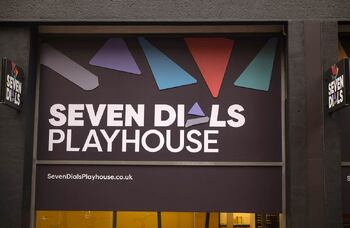Plymouth Conservatoire: 'There's a freedom to be your own artist here'
Founded four years ago in collaboration with the University of Plymouth, Plymouth Conservatoire draws on the benefits of being both a conservatoire and part of a larger university, and has an unparalleled focus on employability
Four years ago, a unique collaboration was formed between Theatre Royal Plymouth, one of the country’s most acclaimed producing theatres, and University of Plymouth, one of its leading academic institutions. The result was a conservatoire like no other, where the boundaries between traditional campus teaching and practical performing arts experience are blurred.
Plymouth Conservatoire draws on the benefits of being both a conservatoire and part of a larger university; it delivers rigorous conservatoire-level training, while also giving students access to the full resources of University of Plymouth, including its libraries, employability services, social events and health and well-being services, not to mention the full campus experience on Plymouth’s beautiful waterfront.
’From the moment you walk through the doors, you’re an artist’
But among the institution’s many strengths, what sets Plymouth Conservatoire apart is its unparalleled focus on employability. Placement officer Ryan Wilce, himself a graduate of Plymouth Conservatoire, works full-time to find placements, internships, work experience and shadowing opportunities for students, both during the course itself and after graduation.
“From the moment you walk through the doors, you’re an artist,” says Wilce. “And Plymouth Conservatoire will help you become whatever kind of artist you want to be. We focus on employability throughout the degree, rather than keeping students back and then launching them into the industry with no practical experience.”
Continues...
The way it works is that students talk to Wilce about the roles and areas they would like to explore, and he draws upon his networks to make it happen. At the same time, artists and companies from across the country get in touch with Wilce when they are looking for emerging artists to work with.
Wilce remembers his time as a student fondly, and his experience feeds into his role now. “It’s so much more than a degree,” he explains. “What I found was that I was immediately part of the industry. During my own degree I spent time building connections and building links to the industry, and then I went off and worked in a plethora of different organisations and job roles. Plymouth Conservatoire had set me up with such a solid network, and that’s something I’m striving to continue as placement officer.
“I want to make sure that when students are graduating, they’re graduating with much more than a piece of paper. I want to make sure they have a huge CV as well. When you study here, you’re really engaging with the industry the minute you come through the doors on day one.”
Continues...
The connection to Theatre Royal Plymouth is a key part of this focus on employability. Some of the most acclaimed companies in the world perform regularly at TRP, and students become embedded in the co-productions that start life there. “You can see people like Robert Lepage and Frantic Assembly develop their work here,” Wilce says. “And students end up with a sense of ownership over the incredible work being made in the city.”
Teaching takes place in the theatre’s fully equipped spaces, and directors and associates from the theatre provide teaching to students. Wilce also works closely with TRP’s talent development producer to provide plenty of employability opportunities to students.
These include performance opportunities unique to Plymouth Conservatoire students, specially reserved scratch-night slots where students can develop their own work, and placements in departments such as wardrobe and engagement and learning. Last year, one of the conservatoire’s graduates took up a graduate internship with TRP, a scheme Wilce hopes will continue in the coming years.
As well as TRP, Wilce has arranged for students to work with a huge number of acclaimed companies, including Jermyn Street Theatre in the heart of London’s West End, the award-winning Kneehigh, Olivier-nominated dance company Far From the Norm, Beyond Face, Frozen Light and many others. None of these opportunities has stopped because of Covid. Wilce has been releasing shadowing opportunities, paid internships and other placements to students throughout the academic year.
Continues...

The placement services that Wilce provides are not only reserved for third-year students, they are also available to everyone from foundation year upwards in all degrees.
There are four undergraduate BA courses on offer at Plymouth Conservatoire: Dance, Acting, Drama and Theatre Practice, and Directing – the directing course is the first BA of its kind in the country – as well as foundation and postgraduate programmes. Plymouth Conservatoire ensures rigorous training in each of these disciplines, providing more contact time for students than other universities, but it promotes a strongly multidisciplinary approach, too. All of the staff teach across all of the programmes. The ethos is one of collaboration. “After all, that’s what the performing arts are all about,” says Wilce.
This collaborative approach allows students to benefit from different specialisms and spheres of expertise. “It creates a really interesting hub of collaboration and networking. That’s one of the hardest things to do – nobody really enjoys networking – but by all working together, students feel confident to network with both peers and staff members. There’s a real sense of community in what we do.”
The ethos is one of collaboration – ’After all, that’s what the performing arts are all about’
Recent graduates have gone on to a huge variety of roles, from a production assistant role on Broadway’s SpongeBob Squarepants musical to a technical swing for Six the Musical and Magic Mike Live in the West End; from a wardrobe manager for Wildworks in Cornwall to a solo artist who has just completed a sold-out run at Reading Fringe and London’s Bread and Roses Theatre. Other graduates have become actors, agents, teachers, postgraduate students and many more besides.
Wilce remembers his time at Plymouth Conservatoire fondly. “There was a real sense of willingness for you to succeed,” he recalls. “You’re always being pushed to do more, to try new opportunities, to experiment. There’s a freedom to be your own artist. I never felt I was pigeonholed into just doing theatre because I was on the theatre programme. I always felt I was being given the opportunity to try new things.”
In his role as placement officer, Wilce is dedicated to ensuring students have that same freedom and variety. “Portfolio careers are increasingly becoming the norm,” he says. “And Plymouth Conservatoire allows you to learn and train in so many different ways. It’s a beautiful place to be.”
Most Read
Across The Stage this weekYour subscription helps ensure our journalism can continue
Invest in The Stage today with a subscription starting at just £5.99







